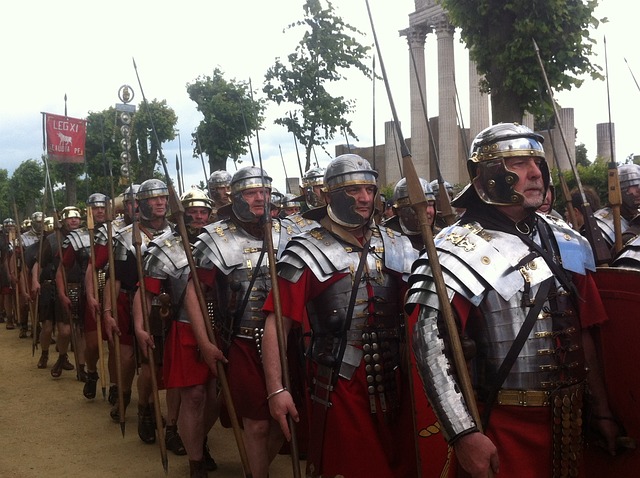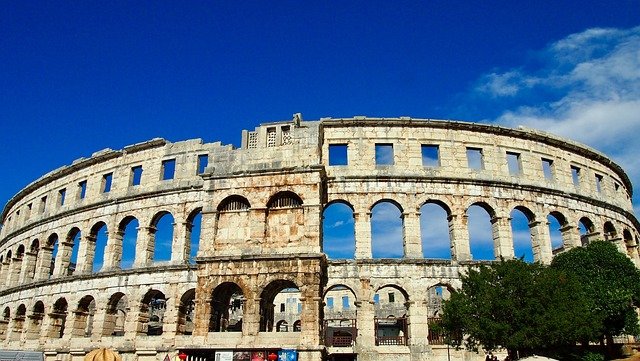The Roman Empire..... almost two thousand years after it reached it's peak and it is still fascinating to us and the standard against which many modern states measure their achievements.
The American Empire is often considered the modern successor to the Roman one, and Russia has called itself "The Third Rome, naming it's rulers Czars (after Caesar). Although technically, Russia could be considered to be a fascinating merging by two of Rome's greatest enemies - the horse nomads of Central Asia, and the Germanic/Scandinavian northern peoples.
For all it's dramatic twists and turns, Rome grew from a city state around the 750's BC to one of the world's great empires, only finally disappearing in 1453 AD with the fall of Constantinople.
So what made it so successful ?

Image by Judith Meyer from Pixabay
The Idea Of Being Roman
The Roman civilisation had huge social cohesion. While there may have been civil wars from the Late Republic onward, they were orchestrated by those at the top. Ordinary Romans didn't often rise in revolt, because they saw themselves as all part of the same thing.
The clever part was that anyone could be Roman, once they had proved thmeslves worthy of it. Even at the very beginning, the city state of Rome shaelessly absorbed neighbouring people and turned them Roman. While the story of the Sabine Women is a myth, it is an accurate allegorical representation of the absorprion of the Sabines into the Roman identity.
By the height of the Empire, anyone could become a Roman citizen, and it was hereditary. If you served in the army as an auxiliary, you'd be granted citizenship at the end of your career. Yes, you'd be old by then, but the important thing is that your sons and grandchildren would be citizens.
This cohesion manifested itself in an incredible ability to withstand hardship and loss. Rome is reckoned to have lost one in six of it's citizens during each of the First and Second Punic Wars. That's a casualty rate comparable to the USSR during WW2. They picked themselves up and carried on.
Long Term Focus
The other thing about social cohesion is that because all Romans thought of themselves as part of a single political entity, the civilisation as a whole had a long term focus.
They were a boisterous bunch, and corruption and greed were rife. But it was only acceptable if you were also working in the interests of Rome as well as yourself.
The long term focus also manifested itself in military and engineering terms. The Imperial legions had long histories, with all the traditions that go with it. Legio V Macedonica is known to have existed for at least 680 years, last recorded in Egypt at the time of the Muslim conquest.

Image by Andreas H. from Pixabay
Infrastructure
The Romans also thought long-term about infrastructure.
They are famous for their roads, and they consistently added to them throughout the empire. While roads had been built previously by other empires, they tended to be crude or only for short distances. For the Romans, they were a vital way to rapidly move armies, trade and messengers. They literally knitted the Empire together.
Equally important were Rome's efforts to provide public hygiene. They built aqueducts, fountains and sewers on a massive scale. Life in the cities may have still been smelly, crowded and violent, but you were far less likely to die of water-borne diseases.
Something else the Romans gave us was the idea of sporting events on a grand scale. The Greeks may have given us theatre and ceremonial games like the Olympics held every few years. But the Romans gave us huge arenas across the Empire where gladiatorial games, chariot races and even sea battles were put on to entertain and divert a bloodthirsty crowd.
We might think of Rome as a marble city. But early on it was mostly mud and brick. Under the Empire, it turned into a truly marble city, but it was all a facade. Thin sheets of marble over cement. It was that waterproof, super-strong cement that enabled the Romans to build so much so fast and so durably.
Adaptability
The final big secret to Rome's success was their adaptability. They didn't actually invent much themselves, but they were masters of taking other people's ideas, optimising the hell out of them and then synergising them with all the other ideas they'd stolen to create something far greater than the original inventors could have thought possible.
A good early example of this was during the First Punic War. They were a land power, Carthage was a sea power. But when a Carthaginian ship was wrecked on a Roman shore, they took it apart, reverse engineered the thing and built hundreds of exact copies.
Things like roads,aqueducts and fountains were all other pewople's inventions. But the Romans standardised and mass-produced them to get economies of scale with an energy and focus that can't be matched.
Their adaptability is also shown in that most iconic Roman thing, the legionary. To most people, if you saw "Roman legionary" the image in their minds will be the tough guy in a red tunic with lorica armour and a rectangular scutum shield. Just like the one at the top of this post.
Actually, they only looked like that for maybe 150 years out of the 2000 year time-span of the Roman Republic and Empire. They were constantly tweaking and developing their arms and equipment to meet the latest threats. And everything was stolen from someone else. They started off looking like a mix of Greek hoplites and Samnite hill warriors. Then they adopted Gallic helmets and chainmail, and Spanish swords and shields. I'll give them the pilum (throwing spear) - that seems to have been their own idea. By the end of the Western Roman Empire, they were virtually indistinguishable from their Germanic enemies.
Conclusion
Hopefully as you can see, there was no one single element that made Rome so successful. Certainly there was an element of luck, but for the most part I'd say it was their cohesion, long term focus, adaptability, and the ability and drive to do everything on a scale larger than their opponents.
Thinking about it, those are all things we could learn from, not just in modern society, but also when developing blockchain-based social media platforms.
Also.... yes, this turned out to be a longer post than I originally meant it to be !
Posted using The BBH Project